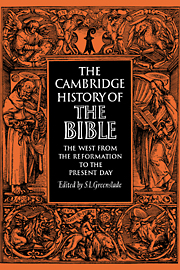Book contents
- Frontmatter
- Chapter I The Bible in the Reformation
- Chapter II Biblical Scholarship: Editions and Commentaries
- Chapter III Continental Versions to c. 1600
- Chapter IV English Versions of the Bible, 1525–1611
- Chapter V The Religion of Protestants
- Chapter VI The Bible in the Roman Catholic Church from Trent to the Present Day
- Chapter VII The Criticism and Theological Use of the Bible, 1700–1950
- Chapter VIII The Rise of Modern Biblical Scholarship and Recent Discussion of the Authority of the Bible
- Chapter IX Continental Versions from c. 1600 to the Present Day
- Chapter X English Versions since 1611
- Chapter XI The Bible and the Missionary
- Chapter XII The Printed Bible
- Chapter XIII Epilogue
- Appendices
- Bibliography
- Notes on the Plates
- Index
- Plate Section
- References
Chapter V - The Religion of Protestants
Published online by Cambridge University Press: 28 March 2008
- Frontmatter
- Chapter I The Bible in the Reformation
- Chapter II Biblical Scholarship: Editions and Commentaries
- Chapter III Continental Versions to c. 1600
- Chapter IV English Versions of the Bible, 1525–1611
- Chapter V The Religion of Protestants
- Chapter VI The Bible in the Roman Catholic Church from Trent to the Present Day
- Chapter VII The Criticism and Theological Use of the Bible, 1700–1950
- Chapter VIII The Rise of Modern Biblical Scholarship and Recent Discussion of the Authority of the Bible
- Chapter IX Continental Versions from c. 1600 to the Present Day
- Chapter X English Versions since 1611
- Chapter XI The Bible and the Missionary
- Chapter XII The Printed Bible
- Chapter XIII Epilogue
- Appendices
- Bibliography
- Notes on the Plates
- Index
- Plate Section
- References
Summary
The Authority of the Bible
“As I walked through the wilderness of this world, I lighted on a certain place, where was a den, and laid me down in that place to sleep; and, as I slept, I dreamed a dream, and behold, I saw a man clothed with rags standing in a certain place, with his face from his own house, a book in his hand, and a great burden upon his back. I looked, and saw him open the book, and read therein.”
The well-known introductory paragraph to John Bunyan's The Pilgrim's Progress is itself an epitome of the place enjoyed by the vernacular Bible in the religious life of the seventeenth century. J. R. Green's statement that the English people became the people of a book, and that book the Bible, is justified by the evidence. But the vogue of the Bible was no peculiarly insular phenomenon, nor was its use confined to devotional reading. It became the source of doctrine and of worship, no less than of piety and hymnody, the object of close and continuous study on the part of scholars as well as the vade-mecum of ordinary Christian laymen. Nor was its influence restricted to religious issues. It became a proof-text for systems of government and ‘an outline of knowledge for boys and girls and their parents’ (to adopt a modern phrase) in various fields of human interest, historical, geographical and cosmographical.
- Type
- Chapter
- Information
- The Cambridge History of the Bible , pp. 175 - 198Publisher: Cambridge University PressPrint publication year: 1963



